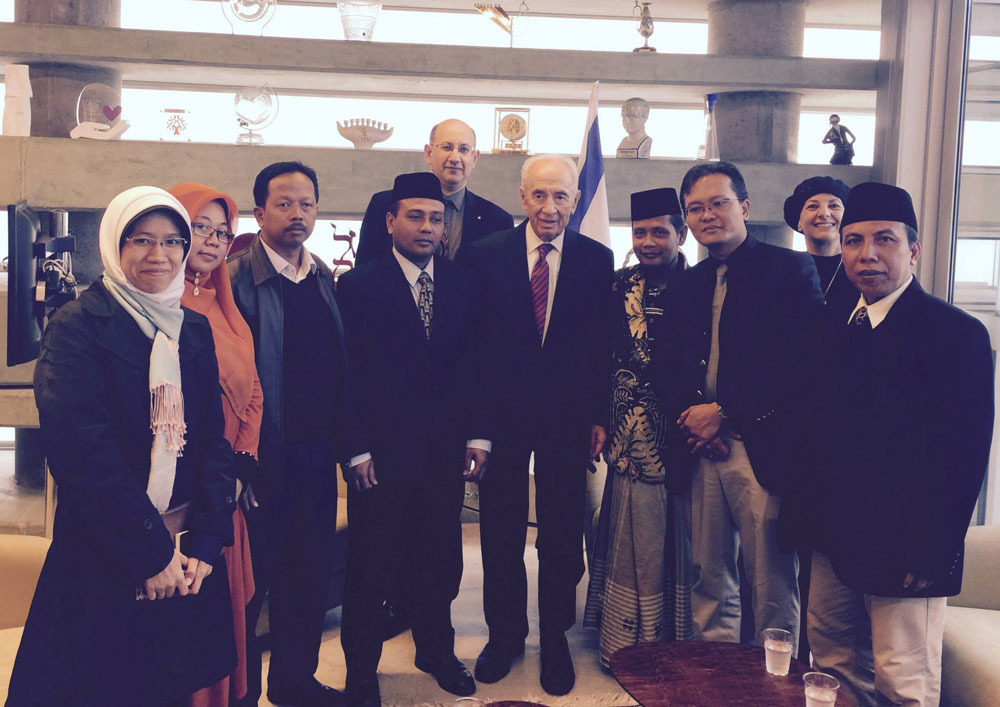Australia/Israel Review
The Last Word: In the Spirit of Gus Dur
Feb 26, 2015 | Jeremy Jones

Jeremy Jones
On a sunny mid-winter’s afternoon in Jerusalem, a group of travellers stopped a passerby and asked for the direction of Mecca. After a brief, friendly exchange, the men and women began afternoon prayers – in Yad Vashem, Israel’s Museum and Monument to the victims of the Nazis’ genocide.
Later, those same people, most of whom began the day with only a cursory idea about Jews, European history or Nazism, participated in a dignified, emotional wreath laying ceremony in Yad Vashem’s Hall of Remembrance.
On a journey to honour the memory of Abdurrahman Wahid (“Gus Dur”), the former Indonesian President who was a champion of interfaith cooperation and positive relations between Indonesians and Israelis, the delegation spent a week in dialogue, engagement and constructive exploration of possibilities to contribute to a better future for Israelis and Palestinians.
Seminars dedicated to sharing experiences and views, on prayer in Jerusalem and on religion and peace building, were run in conjunction with the Elijah Institute for Interfaith Wisdom, an organisation with an impressive Advisory Board of Global Religious Leaders, which had included Gus Dur until his passing five years ago.
Time was spent in an UNRWA-run Palestinian refugee camp, at briefings and high level political encounters in Bethlehem, at the northern border with Syria and Lebanon, by the Jordan river metres from the Kingdom of Jordan and at the Erez Crossing to the Gaza Strip.
In the village of Abu Ghosh, prayers were said in the beautiful, New Mosque, followed by a meal with the mayor, who spoke of life as a Muslim in Israel. Meals and wisdom were also shared in the homes of the charismatic Sufi figure, Ghassan Manasra, in Nazareth, amidst a family overflowing with energy and opinions in Arabaye in the Galilee and with university students in Tel Aviv – an animated and inspirational discussion in Arabic, English, Bahasa Indonesia and a little Hebrew.
A briefing on the administration of religious law in Israel, led by Qadi Mohammad Abu Obeid, flowed into a visit to the exquisite Museum of Islamic Art, then Friday prayers at Al Aqsa Mosque; a discussion on faith and food in the Christian Quarter of Jerusalem’s Old City; candle lighting in the home of Australian immigrants; Shabbat service at an Orthodox synagogue and Friday night meal with the synagogue’s rabbi and his family.
Motivated by a religious belief that human beings should strive for a society which honours and respects every individual, we explored how to avoid thinking in terms of a zero-sum equation.
Christians, Jews and Muslims; journalists, bureaucrats and scholars, civil society activists, religious leaders and students spoke with the group, who were not backward in coming forward with their own opinions.
Prayer was integral to each day’s experiences, and it was a special privilege to be with these accomplished, intelligent and humane men and women, as they prayed facing the Judean Desert, in the home of a rabbi, in an ornate mosque by the Mediterranean Sea and elsewhere.
In the week of the mission, there was scarcely a moment without discussion of Jewish history or world politics, of Jewish and Muslim beliefs and practice, and, as an overriding theme, how individually and together we can contribute to a situation of respect, justice, peace and cooperation.
Gus Dur had first come to Israel to attend the opening of the Peres Peace Centre, and the final event in the programme was a meeting with Shimon Peres, former President of Israel.
Mr. Peres explained that we live in a world with many global challenges, but also opportunities. With new technology, he emphasised, each individual has unprecedented power to do good, and to do so via collaborating with others regardless of geography, nationality or faith.
Leaving the group in Bangkok, as I returned to Australia and they to Indonesia, was not easy, given the camaraderie and friendship we developed. But I feel very confident that these relationships between Jews and Muslims, Indonesians and Israelis, now have a firm foundation and can go from strength to strength – in the Spirit of Gus Dur.






